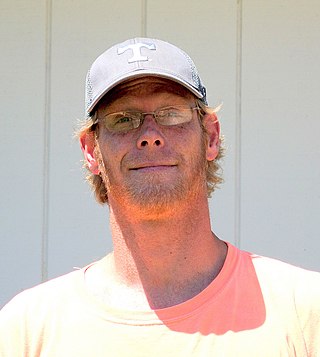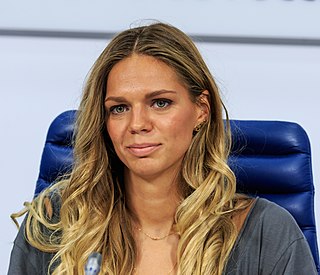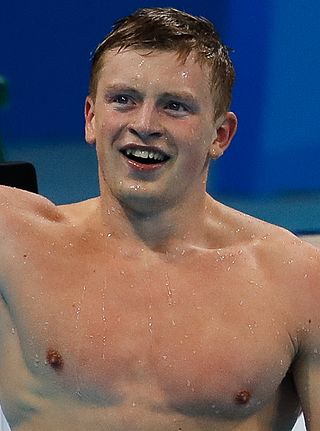
Swimming has been a sport at every modern Summer Olympics. It has been open to women since 1912. At the Olympics, swimming has the second-highest number of medal-contested events after athletics.

Jeremy Porter Linn is an American former competition swimmer, Olympic medalist, world record-holder and current swim coach. Linn set an American record in the 100-meter breaststroke while winning the silver medal in that event at the 1996 Summer Olympics in Atlanta, in a time of 1:00.77. With a burst of speed in the final stretch, he finished just .12 seconds behind the gold medal winner from Belgium who had previously set the World Record.

Clara "Clare" Dennis, later known by her married name Clare Golding, was an Australian breaststroke swimmer of the 1930s who won the gold medal in the 200-metre breaststroke at the 1932 Summer Olympics in Los Angeles, California.
The men's 400 metre freestyle was one of six swimming events on the swimming at the 1908 Summer Olympics programme. Its distance was the median of the 3 individual freestyle event distances. It was the first time an event over 400 metres was held at the Olympics. The competition was held from Monday July 13, 1908 to Thursday July 16, 1908.

Germany competed at the 1912 Summer Olympics in Stockholm, Sweden. 185 competitors, 180 men and 5 women, took part in 69 events in 14 sports. Due to the political fallout from World War I, this was the country's last appearance until 1928.

The men's 100 metre freestyle was a swimming event held as part of the swimming at the 1912 Summer Olympics programme. It was the fourth appearance of the event, which had not been featured at the 1900 Games. The competition was held from Saturday July 6, 1912, to Wednesday July 10, 1912. Thirty-four swimmers from twelve nations competed. The event was won by Duke Kahanamoku of the United States, the nation's second consecutive victory in the event. Cecil Healy took silver, the only medal in the event for Australasia, the short-lived joint team of Australia and New Zealand. Another American, Ken Huszagh, took bronze.
The men's 4 × 200 metre freestyle relay was a swimming event held as part of the swimming at the 1912 Summer Olympics programme. It was the second appearance of the event, which had been introduced in 1908. The competition was held on Friday July 12, 1912 and Monday July 15, 1912.
The men's 200 metre breaststroke was a swimming event held as part of the swimming at the 1912 Summer Olympics programme. It was the second appearance of the event, which had been introduced in 1908. Germany swept the medals in the event. The competition was held from Sunday July 7, 1912 to Friday July 12, 1912.

The women's 100 metre freestyle was a swimming event held as part of the swimming at the 1912 Summer Olympics programme. It was the first appearance of a women's event in Olympic swimming, followed closely by the 4×100 metre free relay. The competition was held from Monday to Friday, 8 to 12 July 1912.

Yuliya Andreyevna Yefimova is a Russian competitive swimmer. She is the Russian record holder in the 200 metre individual medley, 50 metre breaststroke, 100 metre breaststroke, and 200 metre breaststroke. After making her Olympic debut in 2008, she went on to win the bronze medal in the 200 metre breaststroke in 2012, and silver medals in the 100 metre and 200 metre breaststroke in 2016. She is a six-time World Champion, winning the 50 metre breaststroke in 2009 and 2013, the 100 metre breaststroke in 2015, and the 200 metre breaststroke in 2013, 2017, and 2019. In 2019, she became the first woman to win the 200 metre breaststroke at a FINA World Aquatics Championships three times. She is a former world record holder in the long course 50 metre breaststroke. She has won 109 medals, including 48 gold medals, at Swimming World Cups.
The men's 200 metre breaststroke was a swimming event held as part of the swimming at the 1928 Summer Olympics programme. It was the fifth appearance of the event, which was established in 1908. The competition was held from Monday to Wednesday, 6 to 8 August 1928.

Alia Shanee Atkinson, СD is a Jamaican five-time Olympian and a former competitive swimmer whose international competition career spanned 19 years, 2003 to 2021 inclusive, at the senior level. At short course World Swimming Championships, she is a ten-time medalist in individual events, including four gold medals, four silver medals, and two bronze medals. She won a total of 124 medals, of which 74 were gold medals, at Swimming World Cup circuits over the course of her career. She won 14 total medals in individual events, 11 gold, 1 silver, and 2 bronze, from her first three Central American and Caribbean Games, in 2006, 2010, and 2018.

Adam George Peaty is an English competitive swimmer who specialises in the sprint breaststroke events. He won the gold medal in the 100 metre breaststroke at the 2016 Summer Olympics, the first by a male British swimmer in 24 years, and retained the title at the 2020 Summer Olympics in 2021, the first British swimmer ever to retain an Olympic title.

Anton Mikhailovich Chupkov is a retired Russian competitive swimmer. He is the European record holder in the long course 200 metre breaststroke and the Russian record holder in the long course 100 metre breaststroke. He formerly held the world record in the long course 200 metre breaststroke. At the 2015 European Games he won four gold medals in individual and relay events. He won the bronze medal in the 200 metre breaststroke at the 2016 Summer Olympics. He won the gold medal in the 200 metre breaststroke at the 2017 and 2019 World Aquatics Championships.

Caeleb Remel Dressel is an American competitive swimmer who specializes in freestyle, butterfly, and individual medley events. He swims representing the Cali Condors as part of the International Swimming League. He won a record seven gold medals at the 2017 World Aquatics Championships in Budapest, nine medals, six of which were gold, at the 2018 World Short Course Swimming Championships in Hangzhou, and eight medals, including six gold, at the 2019 World Aquatics Championships in Gwangju. Dressel is a nine-time Olympic gold medalist and holds world records in the 100 meter butterfly, and 100 meter individual medley.

Michael Charles Andrew is an American competitive swimmer and an Olympic gold medalist. He was the 2016 world champion in the 100 meter individual medley. At his first Olympic Games, the 2020 Summer Olympics, he won a gold medal and set a world record as part of the 4x100 meter medley relay, placed fourth in the 100 meter breaststroke, fourth in the 50 meter freestyle, and fifth in the 200 meter individual medley. Andrew's swims in 2021 at the 2020 Olympics made him the first swimmer to represent the United States at an Olympic Games in an individual breaststroke event as well as another individual event other than an individual medley in the then-125-year-history of swimming at the Summer Olympics. He has won 78 medals at Swimming World Cup circuits.

Lillia Camille King is an American swimmer who specializes in breaststroke. At the 2016 Summer Olympics, she won the gold medal in the 100-meter breaststroke competition and also won a gold medal in the 4x100 meter medley relay, in which she swam the breaststroke leg. At the 2020 Summer Olympics, King won a silver medal in the 4x100 meter medley relay for her efforts in the prelims, the silver medal in the 200-meter breaststroke, and the bronze medal in the 100-meter breaststroke. At the 2024 Summer Olympics, she won a gold medal in the 4x100 meter medley relay, where she swam the breaststroke leg. She is the current world record holder in the long course 100-meter breaststroke.
Tatjana Smith is a South African retired swimmer who specialised in breaststroke events. She is a two-time Olympic champion and the most decorated South African Olympian in history. Smith won the gold medal in the 200-metre breaststroke and the silver medal in the 100-metre breaststroke at the 2020 Olympic Games, setting Olympic records in both events and the world record in the former, and the gold medal in the 100-metre breaststroke and the silver medal in the 200-metre breaststroke at the 2024 Olympic Games. She is also a World Championships gold medalist (2023) and two-time silver medalist.
Lydia Alice Jacoby is an American professional swimmer. She was the first Alaskan to qualify for an Olympic Games in swimming, competing at the 2020 Summer Olympics in Tokyo in 2021, where she won the gold medal in the 100-meter breaststroke with a time of 1:04.95, which was the fastest time ever achieved by a female American swimmer in the event in the 17–18 age group. Later in the year, she was the overall highest scoring female American competitor at the 2021 FINA Swimming World Cup. In 2022, she became the fastest female American swimmer in history in the 100-yard breaststroke for the 17–18 age group with a national age group record time of 57.54 seconds. In 2023, she further lowered the record to a time of 57.45 seconds, then 57.29 seconds, and set a national age group record of 2:04.32 for the girls 17–18 age group in the 200-yard breaststroke. She is the 2023 NCAA Division I champion in the women's 100-yard breaststroke.

Anastasia R. Makarova is a Russian competitive swimmer. In the 100 metre breaststroke, she won the gold medal at the 2018 Summer Youth Olympics and silver medals at the European Junior Swimming Championships in 2018 and 2019. In the 200 metre breaststroke, she won a silver medal at the 2019 World Junior Championships, a gold medal at the 2018 European Junior Championships, and a silver medal at the 2019 European Junior Championships. In the 50 metre breaststroke, she won a bronze medal at the 2019 European Junior Championships.














